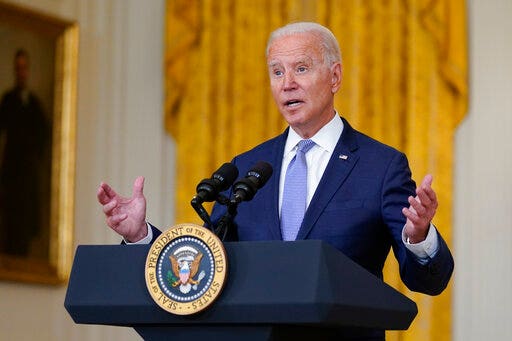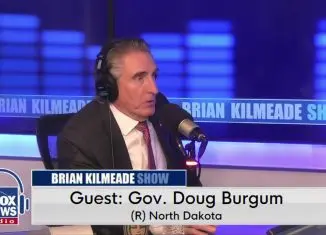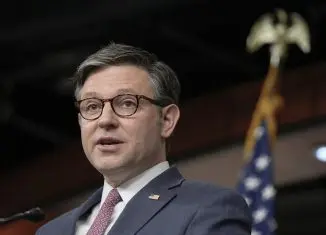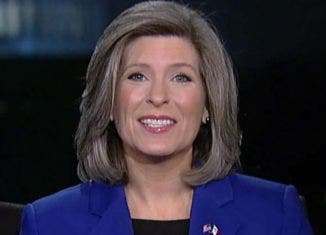Congresswoman Liz Cheney (R-WY) spoke to Brian Kilmeade about the current situation in Afghanistan. Cheney says we’ve watched just the absolute devastation of the last three or four days because of the determination that we needed to withdraw completely and because of the way that that the Biden administration is conducting the withdrawal. Cheney thinks we will find out that President Biden ignored the advice of military advisors and commanders on Afghanistan. Cheney is worried about the message this sends to our allies because America’s security depends on our allies being able to count on us. Cheney believes the agreement that the Trump administration negotiated with the Taliban in 2020 was a surrender agreement. Cheney explained her belief that agreement created a situation where we were legitimizing the Taliban and shutting out the Afghan government and set us on the path we’re on now.
Full transcript
BRIAN KILMEADE, THE BRIAN KILMEADE SHOW HOST: Unbelievable. To put it in perspective, Congresswoman Liz Cheney. Congresswoman, welcome back.
REP. LIZ CHENEY (R), W.Y.: Hey, Brian. Thanks so much for having me back. (INAUDIBLE).
KILMEADE: I mean, listen. You were one of the few people not surprised by this, right?
CHENEY: No, it is — it’s devastating, certainly heartbreaking to watch the scenes from the airport, and you and I have talked about this for years. You know, my view has been that having 2,500 to 3,500 U.S. forces on the ground to conduct counterterrorism, counterintelligence, to help us make sure this Taliban wasn’t able to take over, that they weren’t able to continue to provide safe havens for Al-Qaeda, that that — that was an important deployment for our security, and we watched just the absolute devastation in the last three or four days because of the determination that we needed to withdraw completely and because of the way that the Biden administration is conducting the withdrawal. It’s really devastating.
KILMEADE: I want you to hear what Jake Sullivan just said. I was doing Fox & Friends, so I missed it. He was on NBC. Here’s what he said when we — when he was asked about this being a Saigon moment. Michael Waltz told me this is not true. He says that you can get back and forth in a vehicle, but listen to him try to explain that this isn’t like Saigon 1975. Cut 2.
(BEGIN AUDIO CLIP)
JAKE SULLIVAN, U.S. NATIONAL SECURITY ADVISOR: To be fair, the helicopter has been the mode of transport from our embassy to the airport for the last 20 years.
SAVANNAH GUTHRIE, NBC NEWS HOST: But you know the lesser point.
SULLIVAN: That is — that is —
(CROSSTALK)
GUTHRIE: It’s not the helicopter. It’s not the mechanism.
SULLIVAN: That is how we move people back and forth, so —
(CROSSTALK)
GUTHRIE: No, no. It’s the last minute scramble. You know that. It’s the last minute scramble when the assurances from the president who fought for (ph) this was not what we were going to see.
SULLIVAN: It is certainly the case that the speed with which cities fell was much greater than anyone anticipated, including the Afghans, including many of the analysts who looked hard at this problem.
(END AUDIO CLIP)
KILMEADE: Analysts part of the problem? What about your secretary of defense and chairman of the Joint Chiefs of Staff? I don’t know, Congresswoman. You have better sources than I do. Did they give him bad advice or did he ignore it?
CHENEY: I think that he ignored the advice of his military leaders, and look. You know, Jake Sullivan is right. This isn’t Saigon. It’s far worse. When you have a situation where the very terrorist organization that housed Al-Qaeda, that housed ISIS, but that housed Al-Qaeda as they planned and launched the attacks against us are now back in control of the entire country. They’re going to establish a caliphate.
It’s just — it’s — the damage to our national security is significant. The prisoners that have been released, the extent to which this is going to change what we have to do in order to keep ourselves safe, just a massive, massive failure.
Now, and look, you know, Brian, we talked about this, too. I think the agreement that the Trump administration negotiated with the Taliban in 2020 was a surrender agreement, and that created a situation where we were legitimizing the Taliban and shutting out the Afghan government and set us on the path we’re on now. So it’s — this is the consequences of a policy of American retreat and withdrawal, and it’s very dangerous.
KILMEADE: But they violated everything that they agreed upon. They said they wouldn’t move on the government. They actually, on that framework that they laid out, I was not for. I wouldn’t have been talking to them, period. President Trump wanted to get out, but in speaking with their officials this weekend, including General Jack Keane, they were under the belief after the election that President Trump never would have let it (ph) get this far. And if you don’t believe that, maybe you have a right to not believe it.
Then (ph) think about this. His ego wouldn’t have let him allow the Taliban to take over Kabul in three days. He would have stopped it in its tracks.
CHENEY: Well, look, I mean I — I’m not going to argue with you about the — President Trump’s ego. But I would just say this, that this push to withdraw the 5,000 prisoners that were released as a result of that agreement, the fact that Mike Pompeo is the first secretary of state in history to meet with the Taliban. The fact that they were considering inviting the Taliban to Camp David on 9/11.
I mean, that — that set this all in motion and it was — we were told by President Trump, by Mike Pompeo that the Taliban was going to renounce Al-Qaeda. We were told that the Taliban was going to fight terror (ph) — the terrorists for us. Just — none of that happened.
And I think, you know, what we’re seeing today absolutely is the responsibility of Joe Biden. But I think it’s really important to take a step back and say, listen, you know, the United States has to do what’s necessary for our national security. And in Afghanistan, that meant having the counterterrorism and counterintelligence capabilities that 2,500, you know, forces on the ground gave us. Now, we don’t have that. We’re seeing what happens when we retreat.
And we’ve got to think about now as prisoners have been released across Afghanistan, you know, these global Jihadist movements are going to benefit from that and we’re going to be in a situation where there are going to be additional requirements because of heightened threats in order to keep us safe from Islamic terrorists.
KILMEADE: I — listen, General Austin has been doing this, what, 45 years? He did not know the quality of the Afghan forces? Really? Oh, really? The — General Milley did not know the quality? He said, well — General Austin says, well I couldn’t — I didn’t know they weren’t going to fight. How — if you — did — if you ever were in a boot camp —
CHENEY: Well, I mean —
KILMEADE: — you know the quality of your fighters.
CHENEY: Yes, I guess I would say a couple things. I think that we will find that the military advisors — the military — the commanders here, that President Biden ignored their advice. You know, General Austin is somebody who —
(CROSSTALK)
KILMEADE: But he said in a conference call that very thing, what I just said. He blamed the Afghan forces.
CHENEY: That (ph) — I mean — yes, I know, I was on that call. But they know they’ve now got to carry out the orders that President Biden has issued. I think when you, you know, I think it’s wrong to start talking about, well, the Afghan forces don’t have the will.
You know, we completely stripped them of air power. We — you know — put them in a position where we’ve been working with them, helping them, they had air support, they had our trainers, the 2,500 forces. We were able to prevent the catastrophe that you’re seeing right now. So I think it’s wrong to blame the forces, but I do think —
KILMEADE: Exactly.
CHENEY: — you’ll find this was a decision made contrary to the advice that the president was getting from his senior military leaders.
KILMEADE: Absolutely. So, we’re talking to Congresswoman Liz Cheney who knows enough about national security as anybody in Congress and the White House, to be totally candid.
Congresswoman, when you look at this, we basically set them up in talking to people this weekend, almost like an American force to a degree. They’re used to having commanding officers, but guess who their commanding officers were? Americans.
So, you could want to fight, but if you don’t have a captain, a lieutenant, or a colonel to turn around and say where do I go, that you believe in, it’s over. And that’s what happened. We totally left.
So, listen to Richard Haass who agrees with you about the agreement the Trump team cut. Cut 25. He’s the president of the Council of Foreign Relations.
(BEGIN AUDIO CLIP)
RICHARD HAASS, PRESIDENT OF THE COUNCIL ON FOREIGN RELATIONS: I would actually think the agreement we signed with the Taliban in February of 2020 was a disaster. It undermined the Afghan government.
It asked virtually nothing of the — of the Taliban in exchange for our withdrawal and Mr. Biden, who hasn’t been shy about changing to all sorts of other policies he inherited from Iran to climate change, why was he unwilling to change this policy?
(END AUDIO CLIP)
KILMEADE: Do you have an answer to that, and do you agree with his assessment?
CHENEY: I agree with him. And the idea that the Biden administration is somehow saying we didn’t have the ability to change the bad path we were on, it’s ridiculous. We watched him change policy after policy. And so, the — you know, look. He bears responsibility for this. He made the decision.
Look, just one example. You know, when they set the date certain of everybody’s got to be out by, I think they said August 31st ultimately. You know, that meant that we had to start basically evacuating, turning back over our bases in the country, including Bagram, and the devastation and the tragic scenes that you’re seeing today out of the Kabul airport, we wouldn’t seeing that if we had held onto Bagram.
So there were a lot of decisions that were made that the military determinations about how to conduct this withdrawal clearly that people need to understand what went wrong here. This is — this is certainly not — we should not have been withdrawing in the first place, in my view, but the idea that we’ve got these scenes of death and chaos is really — it’s just going to be hugely damaging for the United States globally. You know, people will look at that. How do you think people in Taiwan feel? How do you think people in Ukraine feel watching these scenes thinking, well, can we count on America?
And you know, America’s security depends upon our allies being able to count on us, so we’ve got to — we’ve got to fix this. It’s not going to be easy. It’s going to require new leadership for the country and a new commitment to reasserting America’s role in the world and recognizing that weakness is provocative.
KILMEADE: So I want to — I want to project now instead of — right now we’re in a situation where we stopped in-fights — civilian fights against civilians out (ph) because we had a couple of guys get caught in the wheel wells. They were hiding in the wheel wells. They died. And then you saw the — you see these images now of people — as the planes taxiing, all these Afghans running to keep up with them, as if let me on this plane, all right.
So they have stopped these flights. Now there’s allies of ours and might even been Americans in Mazar-i-Sharif and Kandahar and other major cities that are going to need to be picked up via Chinook helicopter. And what do you expect to happen? They say — the Taliban said we’re not going to attack at your airport, but a shoulder-fired missile at one of our choppers going into one of these cities where we no longer have assets on the ground, can you tell me how you expect this to play out?
CHENEY: Well, this is — this is a complete mishandling by the military of the orders that were, you know, misguided orders from President Biden. You know, we cannot be in a situation where we have Americans trapped on the ground. We cannot, from a moral standpoint and also from a national security standpoint, be in a situation where, you know, we’ve committed to people to, if you help us, we’ll be here for you, the Afghans, and that we then abandon them.
So we’ve got — we’ve got to ensure that we can get Americans out. We have to ensure that we can get as many of our Afghan translators and those people who have been working with us out as possible. I mean, it is — it is a real shame and a stain on the Biden administration when you watch how this is being implemented over the last several days.
And they need to make sure that they are committing the resources necessary that we get out every single person we can, that we do not —
KILMEADE: Right.
CHENEY: — leave people behind who helped us and worked with us for so many years.
KILMEADE: Now, are you stunned that the president — and I’m up against a break, but are you stunned the president remains in Camp David quite, silenced? No even guarantee he’s going to speak today?
CHENEY: Yes, he has to speak to the nation. I mean, you — this is — it’s outrageous. To have this kind of catastrophe unfolding because of the — directly because of a decision he made and to have him to be silent, that — that is not leadership. He needs to speak to the country.
He needs to explain why he did what he did and he needs to tell us what he’s going to do to protect us from the growing Jihadist threat that we’re going to face as a result of this really misguided and, you know, just fundamentally dangerous decision that he made to pull all our forces out of Afghanistan.
KILMEADE: All right, Congresswoman Liz Cheney, thanks so much.
CHENEY: Thanks, Brian. I appreciate it (INAUDIBLE).
KILMEADE: You got it.






